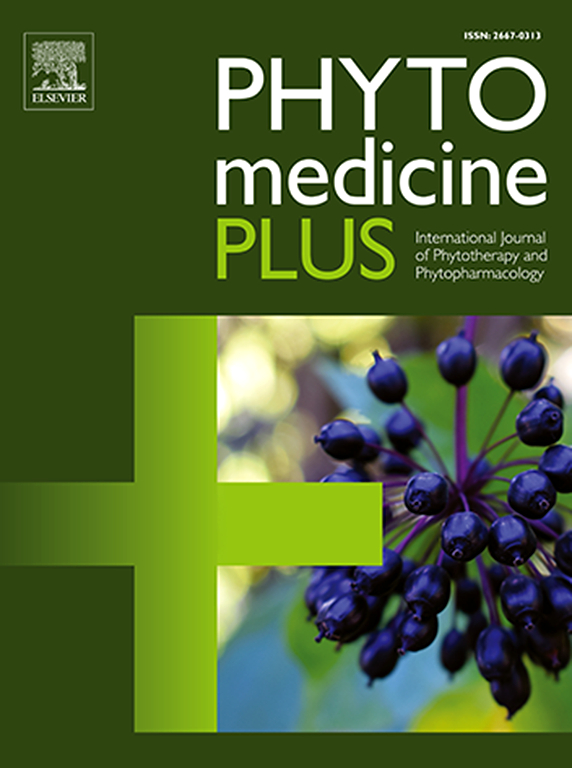迷迭香输注对健康志愿者和1级高血压患者血压的影响
Q3 Pharmacology, Toxicology and Pharmaceutics
引用次数: 0
摘要
传统上,茴香一直被用来治疗各种疾病。临床前试验报道了迷迭香中生物活性化合物的降压作用。然而,其对高血压作用的临床研究尚缺乏。目的:本研究旨在探讨迷迭香输注在健康参与者和1级高血压患者中45天的疗效、安全性和耐受性。方法选取18名健康受试者和35名1级高血压患者,每天用2 g迷迭香叶粉浸泡在100 ml开水中。该研究由15名健康参与者和30名高血压患者完成。采用动态血压监测(MBP)测量基线和干预后的临床和生化参数,如收缩压(SBP)、舒张压(DBP)、平均血压(MBP)、心率(HR)和脉压(PP)。结果高血压组迷迭香输注45 d后24小时收缩压(P = 0.005)、舒张压(P = 0.003)、白天收缩压和舒张压(P = 0.003和P = 0.002)、MBP (P = 0.003)和夜间收缩压下降(P = 0.04)显著降低。相比之下,健康参与者的收缩压或舒张压没有明显变化。生化安全评估显示两组的基线值和干预后值无显著差异。此外,没有不良反应的报道,进一步支持迷迭香冲剂的安全性和有效性。结论本初步试验旨在探索迷迭香输注在45天内降低1级高血压患者收缩压和舒张压的有效性。本文章由计算机程序翻译,如有差异,请以英文原文为准。

The effect of Rosmarinus officinalis L infusion supplementation on blood pressure among healthy volunteers and grade 1 hypertensive patients
Background
Rosmarinus officinalis L, has been traditionally used to manage various ailments. Preclinical trials have reported the antihypertensive effect of the bioactive compounds in rosemary. However, clinical studies on its effects on hypertension are lacking.
Objective
This study aimed to explore the efficacy, safety, and tolerability of a 45-day administration of rosemary infusion in both healthy participants and individuals with grade 1 hypertension.
Methods
A total of 18 healthy subjects and 35 grade 1 hypertensive patients were enrolled and instructed to consume a daily infusion prepared by steeping 2 g of powdered rosemary leaves in 100 ml of boiled water. The study was completed by 15 healthy participants and 30 hypertensive patients. Baseline and post-intervention clinical and biochemical parameters, such as systolic blood pressure (SBP), diastolic blood pressure (DBP), mean blood pressure (MBP), heart rate (HR), and pulse pressure (PP), were measured using ambulatory blood pressure monitoring (MBP).
Results
In the hypertensive group, rosemary infusion consumption over 45 days led to a significant reduction in 24-h SBP (P = 0.005), DBP (P = 0.003), daytime SBP and DBP (P = 0.003 and P = 0.002, respectively), MBP (P = 0.003), and Nocturnal SBP dipping (P = 0.04). In contrast, no significant changes in SBP or DBP were observed among healthy participants. Biochemical safety assessments showed no significant differences between baseline and post-intervention values for both groups. Additionally, no adverse effects were reported, further supporting the safety and efficacy of rosemary infusion.
Conclusion
This preliminary trial allowed the exploration of the effectiveness of rosemary infusion in reducing SBP and DBP in hypertensive patients with grade 1 hypertension over a 45-day period.
求助全文
通过发布文献求助,成功后即可免费获取论文全文。
去求助
来源期刊

Phytomedicine Plus
Medicine-Complementary and Alternative Medicine
CiteScore
3.70
自引率
0.00%
发文量
178
审稿时长
81 days
期刊介绍:
 求助内容:
求助内容: 应助结果提醒方式:
应助结果提醒方式:


